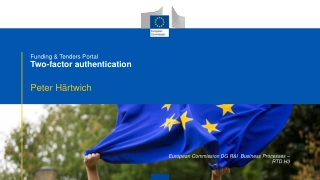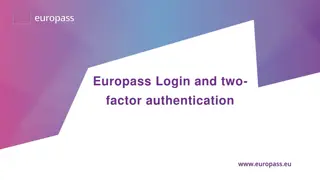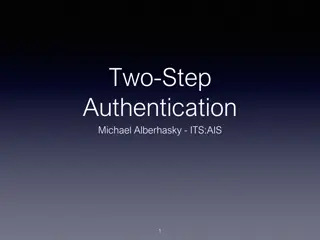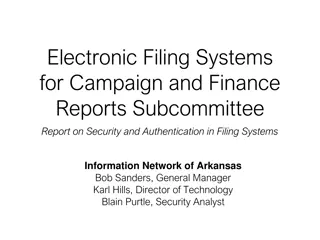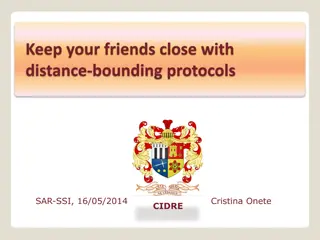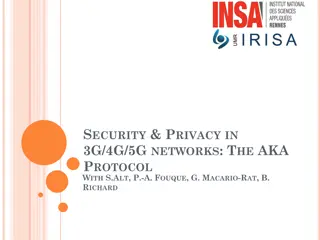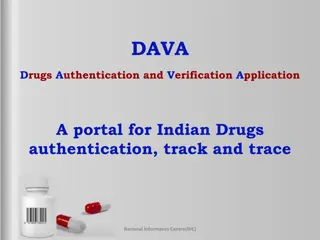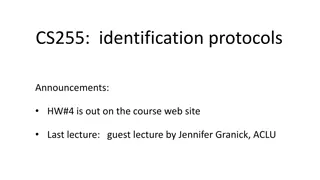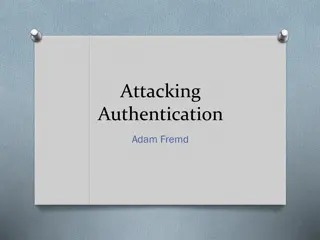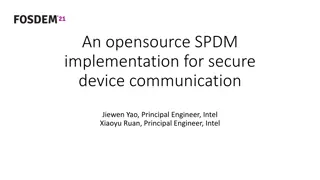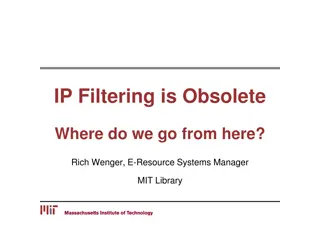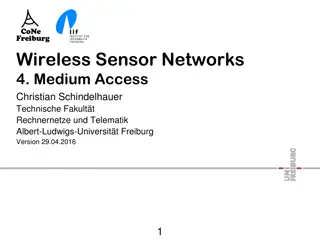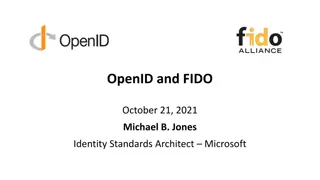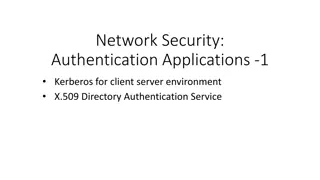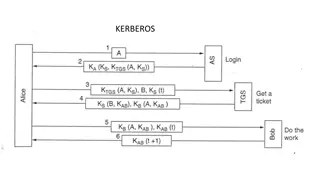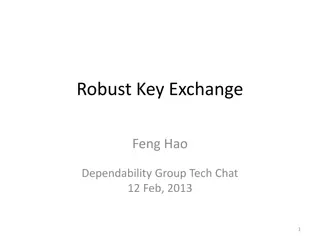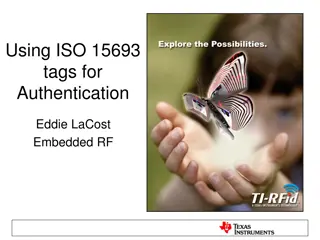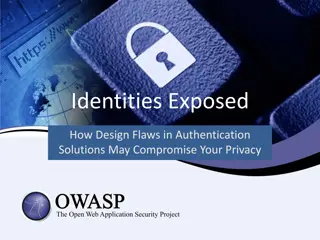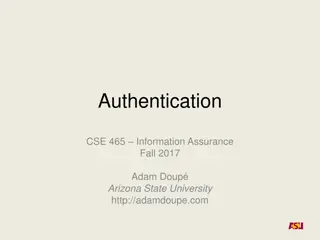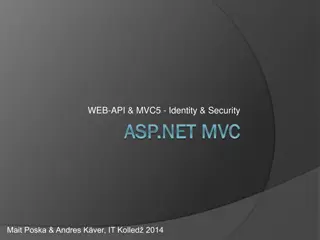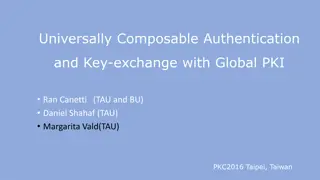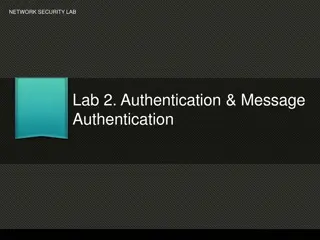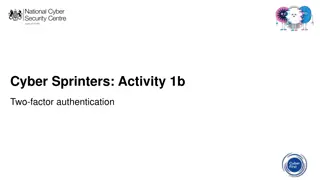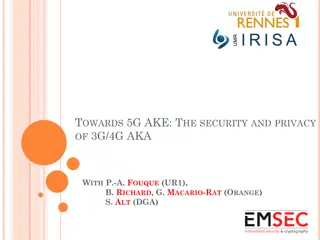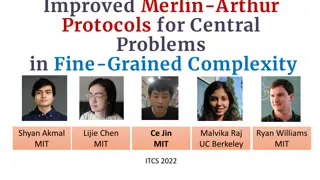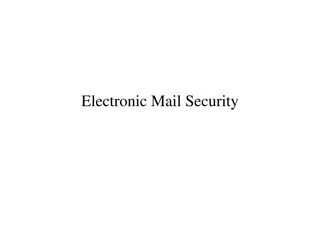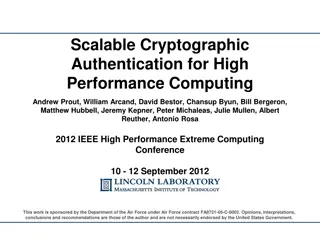Enhancing Security with Two-Factor Authentication in Funding & Tenders Portal
Increase in cybersecurity threats necessitates the use of two-factor authentication in the Funding & Tenders Portal to safeguard valuable information. Users are encouraged to adopt this secure login method, which will soon become mandatory. Methods such as mobile devices, SMS, and security keys are
1 views • 31 slides
Update on SWAG Protocols and New NICE TA Progress Report
Kate Gregory leads the SWAG Protocols update for March 2024, with advancements in new protocols and NICE TA updates. A comparison of activities from Oct 2023 to Mar 2024 shows progress in issuing, reviewing, and drafting protocols. The latest NICE TA additions include treatments for advanced cancers
5 views • 13 slides
Understanding Consistency Protocols in Distributed Systems
Today's lecture covers consistency protocols in distributed systems, focusing on primary-based protocols and replicated-write protocols. These protocols play a crucial role in ensuring consistency across multiple replicas. One example discussed is the Remote-Write Protocol, which enforces strict con
0 views • 35 slides
Guide to Setting Up EU Login and Two-Factor Authentication
Learn how to create your EU Login account and add two-factor authentication for accessing Europass and other EU services. Follow step-by-step instructions to register, verify your email, and set up a secure password. Ensure a seamless process by understanding the difference between Europass and EU L
3 views • 18 slides
Two-Step Authentication Implementation for Enhanced Security
Learn about the implementation of two-step authentication at a university to combat phishing attacks and enhance security. Discover how Duo Security was used to provide a seamless two-step authentication solution, the challenges faced during the enrollment tool setup, and the successful implementati
0 views • 10 slides
Implementing 2FA for UW Azure AD: Best Practices and Options
Explore the implementation of two-factor authentication (2FA) for UW Azure Active Directory (AD) based on key decisions and options outlined in the provided slides. Understand the strategies for enforcing MFA, handling legacy authentication, and transitioning to cloud-based authentication. Discover
0 views • 19 slides
Security and Authentication in Electronic Filing Systems: Arkansas Subcommittee Report
Explore the subcommittee report on security and authentication in electronic filing systems for campaign and finance reports in Arkansas. Learn about user authentication, risks, mitigation strategies, and approaches used in other states. Discover the filing processes in both paper and electronic for
0 views • 24 slides
Secure Composition of Key Exchange Protocols
Explore the game-based composition approach for key exchange protocols, focusing on ensuring security in compositions with arbitrary tasks and the universal composability of protocols. Delve into the Bellare-Rogaway security model and the details of security games in protocol analysis. Understand ke
0 views • 25 slides
Understanding Distance Bounding Protocols in Authentication
Explore the world of distance-bounding protocols for secure authentication, as discussed by Cristina Onete in a presentation covering concepts like relay attacks, mafia fraud, and more with a focus on ensuring privacy and resisting fraudulent activities.
0 views • 39 slides
Taming Adaptivity in YOSO Protocols: The Modular Way
Explore the concept of taming adaptivity in YOSO protocols through a modular approach. The research delves into the efficiency, adversary adaptivity, role assignments, and compiler models in synchronous YOSO protocols. The visual presentations illustrate the framework, challenges, and strategies in
0 views • 19 slides
Security and Privacy in 3G/4G/5G Networks: The AKA Protocol
This content discusses the AKA protocol in 3G/4G/5G networks, detailing the research background, academic journey, and ongoing projects related to security and privacy in network communications. It covers topics such as distance-bounding protocols, privacy-preserving databases, authenticated key exc
1 views • 53 slides
Understanding SAML for Secure Single Sign-On
SAML (Security Assertion Markup Language) is an XML-based framework facilitating authentication and authorization data exchange between an identity provider (IdP) and a service provider (SP). It enables single sign-on (SSO) for many organizations and mobile web applications, offering secure authenti
0 views • 56 slides
DAVA Drugs Authentication & Verification Application by National Informatics Centre
The DAVA Drugs Authentication & Verification Application, developed by the National Informatics Centre of the Government of India, enables authentication, tracking, and tracing of Indian drugs at different packaging levels. Manufacturers maintain Unique Serial Numbers for primary and secondary packa
2 views • 42 slides
Setting Up Two-Factor Authentication for HRMS Access
Learn how to enhance HR system security by setting up two-factor authentication for off-campus access. This tutorial covers the importance of two-factor authentication, using your phone as a second layer of security, initial setup procedures through Wyoweb, requesting permission for HR self-service
0 views • 9 slides
Setting Up Multi-Factor Authentication at Moraine Park
Explore the options for setting up Multi-Factor Authentication (MFA) at Moraine Park, with Microsoft Authenticator as the recommended method. You can choose between using the Microsoft Authenticator app on a smartphone, receiving a text message, or a phone call for authentication. Detailed steps for
1 views • 16 slides
Overview of Identification Protocols in CS255 by Dan Boneh
The lecture in CS255 covers various topics related to identification protocols, including signatures from trapdoor functions, certificates, revocation methods, certificate issuance problems, defense mechanisms like certificate transparency (CT), and moving on to protocols. The talk also explores the
0 views • 43 slides
Understanding Authentication Mechanisms and Security Vulnerabilities
Authentication lies at the core of application security, serving as the primary defense against malicious attacks. This article explores various authentication technologies, including HTML forms-based authentication, multi-factor mechanisms, client SSL certificates, and more. It delves into common d
0 views • 70 slides
Towards Practical Generic Zero-Knowledge Protocols
Exploring the evolution of zero-knowledge protocols, this presentation by Claudio Orlandi from Aarhus University delves into the concepts of Zero-Knowledge from Garbled Circuits, Privacy-Free Garbled Circuits, and more. The talk discusses efficient methods for proving statements and touches on relat
0 views • 29 slides
An Open-Source SPDM Implementation for Secure Device Communication
This article introduces an open-source SPDM (Secure Protocol and Data Model) implementation for secure device communication, developed by Jiewen Yao and Xiaoyu Ruan, Principal Engineers at Intel. SPDM aims to enhance device security through protocols for device authentication, session key establishm
0 views • 29 slides
Authentication and Authorization in Astronomy: A Deep Dive into ASTERICS
Explore the world of authentication and authorization in the field of astronomy through the lens of the ASTERICS project. Learn about the importance of verifying identities and granting access rights, the Virtual Observatory Approach, Single Sign-On standards, and Credential Delegation protocols. Di
0 views • 9 slides
Evolution of User Authentication Practices: Moving Beyond IP Filtering
The article explores the obsolescence of IP filtering in user authentication, highlighting the challenges posed by evolving technology and the limitations of IP-based authentication methods. It discusses the shift towards improving user experience and addressing security concerns by focusing on user
0 views • 22 slides
Wireless Sensor Networks: Medium Access Protocols Overview
This collection of images presents key concepts in wireless sensor networks, focusing on medium access protocols, the ISO/OSI reference model, types of conflict resolution, contention-free protocols, Bitmap protocol, ALOHA algorithm, and its analysis and efficiency. Various protocols and algorithms
0 views • 83 slides
Understanding the Synergy of OpenID and FIDO for Secure Identity Authentication
Explore the seamless integration of OpenID Connect and FIDO protocols to enhance identity verification, prevent phishing attacks, and enable passwordless logins across various platforms and services. Discover how leading companies leverage these standards to create a robust authentication framework
0 views • 12 slides
Understanding Kerberos Authentication in Network Security
Kerberos is a trusted authentication service for establishing secure communication between clients and servers in a distributed environment. Developed at MIT, it addresses threats like user impersonation and eavesdropping by providing centralized authentication. Kerberos relies on symmetric encrypti
0 views • 13 slides
Understanding Kerberos Authentication Protocol
Kerberos is a secure authentication protocol developed at M.I.T. to allow workstation users to access network resources securely. It involves three servers: Authentication Server (AS), Ticket-Granting Server (TGS), and the server performing the requested tasks. The AS verifies users, TGS issues tick
0 views • 12 slides
Challenges in Key Exchange Protocols
Key exchange protocols play a crucial role in ensuring secure communication. This content explores the challenges faced in designing robust key exchange mechanisms, from vulnerabilities in existing protocols like Diffie-Hellman to the complexity of implementing authentication. Despite decades of res
0 views • 51 slides
Understanding Strong Customer Authentication (SCA) for Online Payments in Ireland
The Irish Retail Payments Forum at the Central Bank of Ireland discusses the implementation of Strong Customer Authentication (SCA) under PSD2 regulations. SCA aims to enhance security by validating user identity through two-factor authentication. The deadline for full SCA migration is set for Decem
0 views • 13 slides
Secure Authentication Using ISO 15693 RFID Tags
The authentication process with ISO 15693 tags involves generating a signature using a hash of the tag UID and a private key. This signature, programmed during manufacturing, must match with the one generated by the reader for successful authentication. Advantages include enhanced security with priv
0 views • 7 slides
Uncovering Flaws in Authentication Solutions: A Privacy Concern
Delve into the potential privacy risks posed by design flaws in authentication solutions, as discussed by security consultant David Johansson. Explore scenarios where digital identities can be compromised, the implications of exposed electronic IDs, and the urgent need for software updates to safegu
0 views • 34 slides
Understanding Authentication and Authorization in Information Assurance
Explore the concepts of authentication and authorization in information assurance through a series of visuals and explanations provided by Adam Doup from Arizona State University. Learn about authentication terms, mechanisms, password systems, and UNIX standard hash functions. Gain insights into how
1 views • 26 slides
ASP.NET Web API Security and Authentication Overview
Explore the essential elements of ASP.NET Web API security, including HTTPS transport security, authentication filters, access to client identities, and OWIN middleware. Learn about securing your Web API with integrity protection, replay protection, and encryption for confidentiality. Dive into the
0 views • 29 slides
Comprehensive Examination Questions on Data Management Systems and Security Protocols
This content covers a range of topics related to data management systems, including two-phase locking and two-phase commit protocols, Bayou system with vector clocks and causality, digital signatures and certificates in protocols, and authentication protocols. Questions include scenarios and concept
0 views • 6 slides
Modular Security Analysis for Key Exchange and Authentication Protocols
Explore the modular security analysis approach used to examine the security of key exchange and authentication protocols, focusing on the universally composable authentication with a global Public Key Infrastructure. The analysis involves splitting the system into smaller components, separately anal
0 views • 15 slides
Understanding Authentication and Message Authentication in Network Security
Authentication is crucial in establishing identity in the digital world to access rights, products, and services. It involves validating credentials to prove identity and ensure security. Message authentication confirms the integrity and origin of transmitted data, preventing alteration or unauthori
0 views • 24 slides
Understanding Two-Factor Authentication for Enhanced Security
Two-factor authentication adds an extra layer of security by requiring two verification steps to access an account. This process helps prevent unauthorized access even if passwords are compromised. Explore different types of two-factor authentication methods such as text message, fingerprint scanner
0 views • 8 slides
Enhancing Security and Privacy in 5G AKE Protocol
This content discusses the authentication and key exchange (AKE) protocols in the context of 3G/4G and the upcoming 5G networks. It covers the challenges of securing communication over insecure channels, the typical 2-party AKE authentication process, the security aspects of AKE against adversaries
0 views • 24 slides
Understanding Authentication in Networking Environments
Authentication is a crucial process in computer networks where clients prove their identity to servers. This article covers the concept of authentication, its importance, and specific guidance on network authentication, particularly focusing on Windows and Linux VMs. Key topics include the use of pa
0 views • 30 slides
Improved Merlin-Arthur Protocols for Fine-Grained Complexity Problems
The text discusses Merlin-Arthur proof systems and protocols for central problems in fine-grained complexity, particularly focusing on the time complexity, completeness, and soundness of these protocols. It also touches on recent interest in these protocols and presents new results in areas such as
0 views • 16 slides
Understanding Electronic Mail Security: PGP and S/MIME
Explore the world of Electronic Mail Security through the lenses of two prominent systems - PGP and S/MIME. Learn about the origins of PGP encryption, the authentication and confidentiality problems it addresses, and the utilization of S/MIME in business and personal electronic mail. Discover the ke
0 views • 10 slides
Scalable Cryptographic Authentication for High Performance Computing
This work discusses the scalable cryptographic authentication approach developed by Andrew Prout and team for high-performance computing. The LLGrid system architecture, challenges with interactive supercomputing, and utilization of LLGrid for various computing tasks are explored, highlighting the i
0 views • 34 slides
